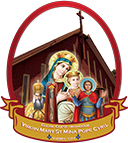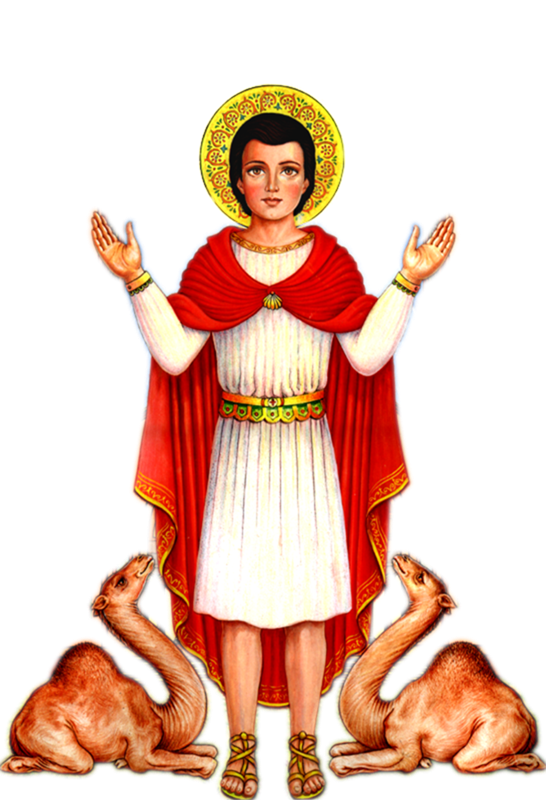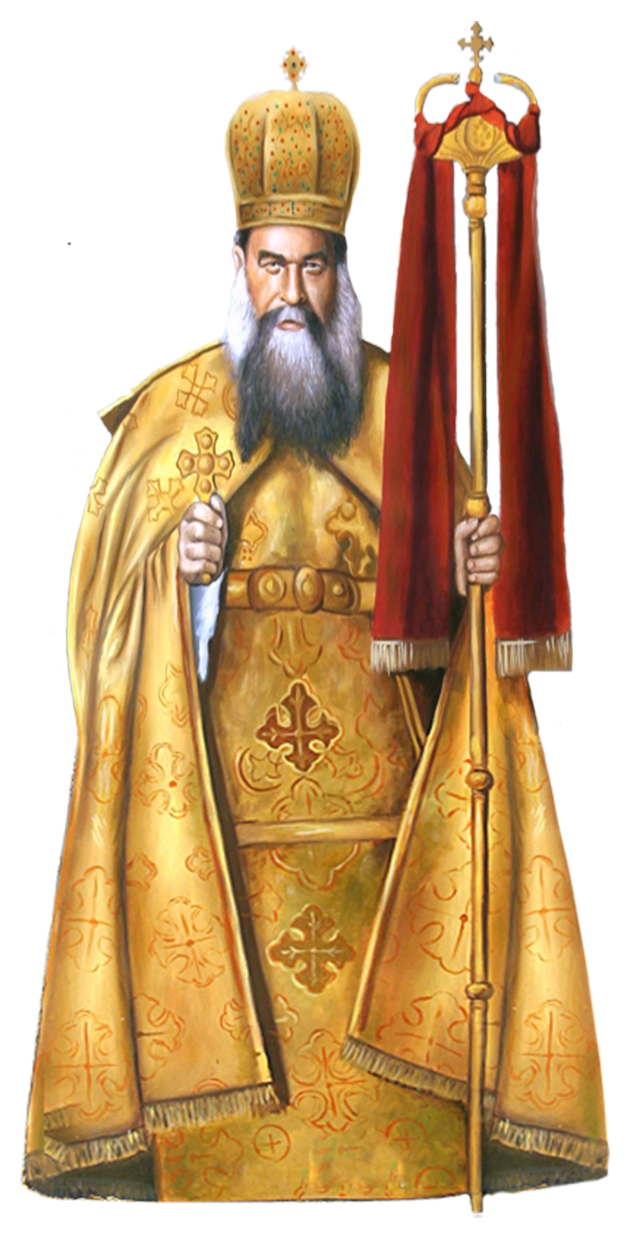WELCOME TO
Virgin Mary, St Mina & Pope Cyril
Coptic Orthodox Church

The Copts are the original Egyptians, and the word “Copt” itself is derived from the Greek word “Aegyptus” which means Egypt. The Copts are the descendants of the ancient Egyptians. They are considered one of the most anthropologically pure races in the world.
The Coptic Orthodox Church of Alexandria is a very conservative Church, which preserves most carefully the Christian Faith, in its earliest and purest form, passed on from generation to generation, unaltered and true to the Apostolic doctrine and patterns of worship. It is a deeply spiritual and even mystical Church, with an emphasis upon holiness, and the Mysteries of Faith, but at the same time it is a strongly doctrinal Church, holding faithfully to the canons of the Holy Scripture and the Apostolic and Orthodox Creeds and Teachings of the Church Fathers of the first three Ecumenical Councils.
The Coptic Orthodox Church
The Coptic Church is one of the most ancient Churches in the World (along side the Churches of Jerusalem, Antioch, and Rome), having been founded by Saint Mark the Apostle, during the first century A.D. (traditionally, in 43 A.D. or 61 A.D.). Eusebius states, in his Ecclesiastic History, that Saint Mark came to Egypt during the first or third year of the Roman Emperor Claudius (i.e. in 41-42 A.D. or 43-44 A.D.) and he visited Alexandria again, to preach and evangelize, between 61 and 68 A.D. Saint Mark’s first convert was a shoemaker of Alexandria, Anianus, who was consecrated a bishop, and later succeeded him as Patriarch.
Saint Mark was the first Patriarch of the Coptic Church, and he received his martyrdom in Alexandria on the Feast of Resurrection (Easter) in 68 A.D. at the hands of Pagan Egyptians who were celebrating the feast of Serapis in the great temple of Serapium. The Patriarchs of the Coptic Orthodox Church have continued in a line of unbroken succession from Saint Mark until the present day. The current Patriarch, Pope Shenouda III, is the one hundred and seventeenth Patriarch to occupy the Chair of Saint Mark in the See of Alexandria. The full official title of the Patriarch of the Coptic Orthodox Church is “Pope and Patriarch of the great city of Alexandria, the Middle East, Ethiopia, Nubia, and the Pentapolis (*).
Throughout the years the Coptic Orthodox Church has stood firm and has remained faithful to her Apostolic Traditions and Orthodox Faith, despite waves of fearful persecutions under pagan Roman Emperors, and to lesser extent under Byzantine and Arab rulers, and in the face of serious heresies that attacked the very fiber and essence of the Christian Faith and threatened to split the Church and all of Christendom.
The Egyptians were a deeply religious race by nature and they responded gladly to the preaching of Christian Faith, having been left with a deep spiritual vacuum following the final dethronement of their Pharaoh and god, and the decline of the ancient Egyptian Religion, with its symbol of Ankh, the triads of gods, the eminence of the gods in the land of Egypt, the national devotion to the goddess Isis and her son Horus, the death and the resurrection of a god, and the concepts of future judgement and immortality, had done much to prepare the people for the coming of Christianity.
The Egyptians were naturally proud of the fact that Christ has hallowed their land with His presence, during His earthly life. Egypt was indeed blessed by God, as His people (Isaiah 19:25; Hosea 11:1).
In 30 B.C., after the defeat of Mark Anthony at the battle of Actium, Egypt has been incorporated into the Roman Empire, bringing an end to the rule of Ptolemies and sounding the final death knoll for the great 3,000 year long Ancient Egyptian Civilization. Egypt now became the granary of Rome, and a source of personal wealth for the Emperor, which resulted in a serious drain upon the resources of the land and the people. However, the external Roman imperial conflicts and troubles over succession to the throne did not directly affect Egypt, and she enjoyed a period of little political change, in which the major event and development was the spread of Christianity throughout the land.
By the end of the Second Century, Christianity was well established in Egypt, although there were still pockets of paganism existing side by side with the new Faith. By 190 A.D., the great Church of Alexandria was exchanging Paschal epistles with the Churches of Jerusalem and Antioch, concerning the date of Easter, and there were about forty Bishoprics, under the Patriarch of Alexandria, in the North of the country (in the Delta area). By 202 A.D. Eusebius mentioned that there were Christians in the whole Thebaid, in Upper Egypt, 800 km up the Nile Valley. Saint Athanasius states, in his Festal letters, that there were Christians in the small and large oases, in the heart of the desert, by 329 A.D.
During the first centuries of the Christian Church, the famous Catechetical School of Alexandria was an important light and means of instruction in the Christian Faith and the study of theology, as well as of knowledge in the Sciences, and the need to discuss and interpret their faith within the philosophical and intellectual milieu of Alexandria scholarship and learning.
The pre-Christian school had been founded by Ptolemy Soter in 323 B.C., and during the region of Ptolemy Philadelphus in 288 B.C., it was developed to include, not only Greek philosopher, but also other nationalities, such as the 70 Jewish Rabbis who worked on the Septuagint Greek translation of the Old Testament in Alexandria. The School of Alexandria contained the world famous Library and Museum (the Pagan School), and it became the major set of learning and philosophy for the whole of the Ancient Hellenistic World.
The Christian School of Alexandria (called Didascalium) offered instruction in the Christian faith and theology, along side study of the civil science, such as philosophy, medicine, physics, chemistry, anatomy, physiology, mathematics, geometry, astronomy, history, geography, music, and ancient and modern languages. It was open for Catechumens (pagans who believed in Christ but who had not yet been baptized), and for Deacons or Christian students who desired a deeper knowledge and understanding of Christian Doctrine and Faith, as well as for pagans students who were still searching for the Truth.
According to Tradition, St. Mark had opened the first Christian Catechetical School in Alexandria for the instruction of the new converts, and during the following two centuries, the Didascalium developed and expanded under the Deanship of great philosophers and doctors of theology, such as Athenagoras, Pantaenus, St. Clement of Alexandria, Origen, St. Athanasius and, St. Didymus the Blind.
Under the supervision of St. Pantaenus and St. Clement, the New Testament was translated from Greek into Coptic, a translation which is still highly respected and used to this day in the Coptic Orthodox Church. The Catechetical School of Alexandria has also the Canon of Holy Scripture. Several of the early Deans of the School also became Patriarchs, like Abba Justus, the first dean of the School, who became the 6th Patriarch (132-143 A.D.); Abba Eumanius, 7th Patriarch (143-154 A.D.); Abba Markianos, 8th Patriarch (154-163 A.D.); Abba Heraclus, 13th Patriarch (232-249 A.D.); Abba Dionysius, 14th Patriarch (249-270 A.D.); Abba Petros, the “Seal of the Martyrs”, 17th Patriarch (293-303 A.D.), and Abba Archelaus, 18th Patriarch (303 A.D.). Other distinguished teachers or graduates of the school became Patriarchs of the Coptic Church, among whom were Abba Alexandros, 19th Patriarch (303-326 A.D); St. Athanasius the Apostolic, 20th Patriarch (378-384 A.D.); Abba Kyrillos “The Pillar of Faith”, 24th Patriarch (412-443 A.D.) and Abba Dioscorus, “The Interpid Hero”, 25th Patriarch (444-456 A.D.). These early Patriarchs were considered the “Guardians of Orthodoxy” and their learning earned them the reputation of “Universal Teachers”.
Graduates from other theological schools, in other parts of the Christian World, later came to study at the school of Alexandria, including St. Gregory the Theologian (329-389 A.D.); St. Basil the Great (330-379 A.D.); St. John Chrysostom (347-407 A.D.); St. Jerome (342-420 A.D.) and St. Rufinus (345-410 A.D.). Thus the School of Alexandria became the Lighthouse of Christianity, for a span of five centuries, until the reign of Justinian (529 A.D.). After 451 A.D. and the Council of Chalcedon, the Emperors of Constantinople, in their persecution against the Copts, closed the school and carried away most of the books, The main center of learning for the Coptic Church was then transferred to the Monastery of St. Macarius, in the Wadi El-Natroun desert, where it continued for several centuries.
The Church of Egypt enjoyed peace for almost the first two centuries of her existence, until A.D. 203, when the Emperor Septimus Severus issued an edict forbidding conversions to both Christianity and Judaism. Torture, martyrdom, and the temporary closure of the School at Alexandria resulted. Great persecutions were suffered under Emperor Decius (249-251 A.D.) and in 250 A.D., an imperial edict decreed the enforced offering of worship of idols by every Roman subject, upon the penalty of execution. Cruel persecutions of the Christians continued under Emperor Gaius (251-253 A.D.) and under Emperor Valerian (253-260 A.D.), until the Edict of Tolerance, issued by his successor, Gallienus (260-268 AD), which brought a temporary end to the persecution and allowed churches to be built.
However, this period of peace was only a short respite, for with the acceptance to the imperial throne of “Diocletian” in A.D. 284, the most severe and bloodiest period of persecution of the Coptic Church began. In A.D. 303, “Diocletian” issued a decree that ordered all churches to be demolished, all Scriptures and sacred books be burnt and all Christians, who were not officials, to be made slaves. This intense period of persecution resulted in the widespread of torture and the martyrdom of thousands of Christians, because of their courageous testimony for Christ. So many Coptic Christians lost their lives during this period, for their faith, that the Coptic Church dates her calendar from A.D. 284, the year of accession to the imperial throne of Diocletian, and the beginning of the Era of Martyrs (Anno Martyri or A.M.).
After the Abdication of Diocletian and the succession of Galerius (305-311 A.D.) and Maximinus Daia (311-313 A.D.), there was a brief respite for Egyptian Christians, but it was not long before a new Edict of Persecution was issued by these two rulers. Only after the accession to the imperial throne of Constantine the Great, his conversion to Christianity and the Edict of Tolerance in A.D. 313, after the Battle of Milan, did Christianity become the recognized religion of the Empire, and the waves of cruel persecution under the pagan Roman emperors finally ceased. The Martyrdom in A.D. 312, of St. Peter, the “Seal of the Martyrs”, 17th Patriarch of Alexandria, has set the seal on this terrible period of persecution of the Egyptian Church.
The Coptic Synaxarion (selected biographies of Martyrs and Saints for Each day of the year) and the Coptic “Difnar” (Antiphones for the Saint or Saints of the day) are full of stories of these courageous Martyrs. The Feast day of the martyrs is still celebrated on 1 TUT, the first day of the Coptic New Year (11/12 September), to commemorate the faithfulness of these men, woman and children martyrs, whose blood indeed became the “seed of the Church” (Tertullian).
Between these waves of persecution however, Christianity spread through Egypt quite rapidly, helped by the siege of Alexandria, which resulted in the movement and importation of soldiers, many of whom were Christians, and also encouraged by zealous and fearless witness of the Martyrs and Confessors. The New faith spread first to Fayoum, which was visited by Anba “Dionysius” in about A.D. 257, and then about 100 km further south. It does not seem to have reached much beyond this until after the time of Decius.
After the edict of tolerance, issued by Gallienus in A.D. 260, Christianity quickly spread further south into the Thebaid, and it was here that the great persecutions of Diocletian were most greatly felt. However, Christianity was still not the the religion of the majority of Egyptians, even in the North, although by the end of the 3rd century, over one hundred Bishoprics were established in Egypt. It was only during the 4th Century that the pagan masses of Middle and Upper Egypt were in stages won to Christianity. In A.D. 300, in Oxyrhynchus, there were still twelve Temples and only two Churches. During the 5th Century the situation was reversed and by the 6th Century there were thirty Churches in the vicinity.
After A.D. 313 and the Edict of Tolerance, issued by Constantine the Great, Egypt entered into a new era in her history, now under Christian Byzantine rule that was to last until the Islamic Conquest in A.D. 641, Christianity was officially recognized in Egypt, as it was through the Mediterranean world, and the Imperial capital was transferred from the West to Byzantium, which was also renamed Constantinopole. With the new freedom of the Church, a rapid growth of Christianity took place in Egypt, resulting in a mass conversion of the pagan Egyptians to the Christian faith, as is documented in the manuscripts of episcopal lists and monastic writings.
The Coptic Orthodox community in Quebec City, capital of the French speaking Quebec Province, east of Canada, and situated geographically 235 km to the north east of Montreal, is a small, but yet still growing community.
Some individuals were established in Quebec City more than 30 years ago, whereas other new generations arrived in the last 5-10 years. The community shows a mixed generation in age and profession, with some Laval University professors in different faculties, doctors, engineers, business men and restaurant owners, altogether with students in different faculties of Laval University.
The relative short distance to Montreal was an asset for this community to travel to Virgin Mary Coptic Orthodox Church in South shore Montreal (closest Coptic Orthodox Church) to attend liturgies and different religious services.
Holy Liturgies were celebrated in the small Chapel of Laval University, with a Bible meeting on Friday evenings in one of the community members houses, on a rotatory base. Later, all church activities, including Bible Studies, were grouped in the same University Chapel.
The Coptic Community started having access to an Irish Catholic Church (St. Stephen’s & St. Vincent’s Chapel) since spring 2010 when first Easter was celebrated in this Chapel. The Chapel was shared at that time by the Irish Catholics, Lebanese Melkites and the Egyptian Copts.
With the Grace of our Lord, the community has access nowadays, only by themselves, to this Chapel, and since summer 2011, all Church activities are performed in it, together with preserving the opportunity of having the University Chapel whenever needed, where some Youth meetings and Bible Studies still take place over there.



